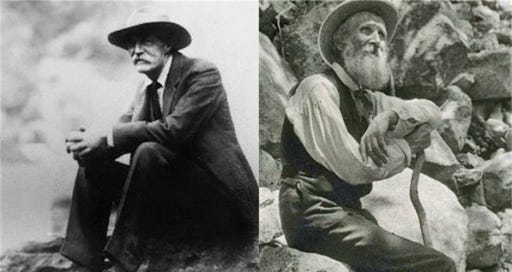Muir, Pinchot, and the Importance of Cooperation and Conflict
In the early 20th century, large portions of the western United States were uninhabited, unprotected, and used for intense, dangerous foresting and commercial activities. This presented a clear problem, but the solution was hotly contested.
Two big players in the environmental field at the time were John Muir and Gifford Pinchot, who argued for conservation versus preservation. Muir, a naturalist and author, advocated for preservation--the complete protection of forests-- with no development or destruction under any circumstance. He sought a forest system similar to the few national parks that had already been established with land that was preserved and administered by the federal government. On the other hand, Pinchot’s idea of conservation toed the line between extreme preservation and commercial interests, as he believed land should be used responsibly for multiple purposes. His vision for the contested land was space for recreation and responsible mining, logging, and scientific research. These two men would engage in a public battle of wills, culminating with the 1897 Organic Act and the creation of the United States Forest Service in 1905.
Gifford Pinchot was the eventual winner of the rivalry. The 1897 Organic Act allowed the U.S. government to preserve public lands for the use of American citizens, and laid the base for the creation of the U.S. Forest Services, which Pinchot would lead. These pivotal actions followed his policy of conservation; the land would be protected by the government but still able to be used for recreation and certain regulated commercial pursuits. Although Pinchot may have won in this aspect, ultimately, Muir’s dream of preservation was realized with the creation of the National Parks system in 1916, as large amounts of land were set aside with no development.
Muir and Pinchot’s struggle is reminiscent of environmental arguments in the present day. There is no shortage of problems to be solved, and no shortage of solutions to be passionately argued. Although it can be frustrating to defend a position, opposition only strengthens arguments and brings attention to the cause. No one is going to be more critical of a position than an opponent. Understanding and taking into account criticism is the best way to reinforce an idea and prevent future arguments. Every reaction from critics is a learning experience when one is committed to creating the most positive impact on the world. Only strong ideas come to fruition; only strong ideas can withstand and adapt to disapproval.
In addition, disagreements can bring increased attention to one’s cause. For example, Muir published his advocacy for preservation in the magazines the Atlantic and Harper’s Weekly. His tool to argue against conservation reached more people than would have originally heard about the problems with developing forests, which spread awareness. This is true for those advocating for environmentalism today; arguments are brought into greater public consciousness because of the controversy. For example, disagreements over the Green New Deal have led to increased awareness of environmental issues. After protests at Capitol Hill in 2018, contention over the deal increased until it became a hot ticket issue in the 2020 election, attracting the attention of the nation. The dispute about the Green New Deal follows the trend of Muir and Pinchot’s contention -- public quarrels lead to increased publicity. Disagreements can be more valuable than agreements, as long as they are used correctly to foster purposeful change.
With that being said, it is important to choose your battles. Environmental advocates often get dragged down by relatively smaller disagreements, like in the battle between Muir and Pinchot. While both men had the same intentions--the protection of American land-- their philosophies on what kind of protection was preferable differed. Nuance is incredibly important within arguments, but if there is a common goal to be reached, it’s valuable to ensure that goal is reached before focusing on what can be divisive nuances. In the end, there is room for different ideas in the world, and any common ground between the ideas serves only to help both parties. Any step in the right direction is good. Pinchot may have won the conservation versus preservation debate.To this day, many large National Parks are surrounded by National Forests, symbolic of the necessity of conflict and cooperation in furthering similar environmental goals.
Brooke Baggett is a senior at Plano East Senior High in Plano, Texas. She is a student in the International Baccalaureate program and has been involved in National Honor Society, varsity and show choirs, and Learncast. She likes reading, birds, and the environment.




